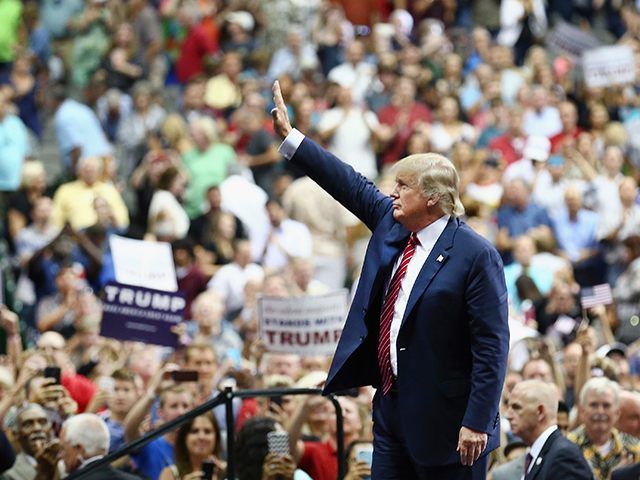With the healthcare debacle in the rear view mirror for the time being, the consensus is that the administration badly needs a victory this year on tax reform if the president is to regain the political momentum he lost by following the lead of the hapless GOP congressional leadership who sold him on Obamacare repeal as an early, easy win.
But while it’s true that getting a legislative win on tax reform is crucial, it is becoming increasingly clear that the only way the president will achieve that goal is by dismissing the advice of not-so-brilliant legislative strategists who convinced him that the path to victory on health care was the traditional one of whipping votes exclusively in the unruly and unreliable GOP caucus. That strategy has led to the miserable record of this remarkably unpopular, do-nothing Republican Congress, in which the only legislative activity of note is the passage of a bill of questionable constitutionality, handcuffing the President’s ability to engage in foreign policy through the use of sanctions.
To win on tax reform, Trump needs to return to the successful populist approach of his campaign and stop trying to cobble together votes from wildly disparate elements in a dysfunctional Republican caucus that can’t even agree on the time of day. In fact, the only chance for comprehensive tax reform, including a substantial reduction in the corporate tax rate to make American businesses more competitive, is to include populist elements that GOP leaders have deemed ideologically unacceptable for decades.
It is no coincidence that every attempt at tax reform by a Republican Congress since the Reagan era has ended in failure and that all have followed the same general blueprint: further flattening and reduction in marginal tax rates coupled with a reduction in the corporate rate. In their ideological blindness, they seem to have forgotten the dual lessons of Reagan’s successful tax reform packages of 1981 and 1986. First, popular buy-in from middle-class Americans who will see a reduction in their overall tax burden is essential to success, as opposed to just relying on corporate interest groups who would benefit from reform. Second, those same populist components of a tax reform package put pressure on vulnerable Democrats across the aisle to vote for things that go against their party brand, even to the point of reluctantly giving a victory to a president from the opposing party.
To do this, Trump must shrug off the libertarian pablum of the Koch Foundation and their allies both in the administration and on the Hill who have locked Republicans into a recipe for tax reform defeat for decades. That would mean radically altering the tax cut paradigm in ways that these interest groups have opposed tooth and nail, but would win a large measure of popular approval and thus put enormous pressure on reluctant members in both parties.
During the campaign, Ivanka Trump made an impassioned pitch for paid leave for child care that left Republicans scratching their heads, and Democrats on the defensive. Steve Bannon has reportedly proposed an increase in the income tax rate to 44 percent on those earning over $5 million, anathema to the Koch brothers, but likely to find few objections on main street. Other items that could help win support for (and help pay for) a reduction in the corporate rate include eliminating the deduction for carried interest (something Trump endorsed in the campaign), an upward adjustment of the capital gains tax, and a return to the theme of selective tariffs for countries that have put up trade barriers to U.S. products as opposed to the already-abandoned “border adjustability” tax, which was always an attempt to take the teeth out of true trade reciprocity from those who actually oppose using the leverage of access to the lucrative U.S. market to attain better access for U.S. products overseas.
Each of these elements, while being a radical departure from the GOP playbook of the last 30 years, would make it harder for Democrats to vote against a tax reform package, and force reluctant Republicans to face the difficult prospect of voting against tax reform because of elements that their constituents support. If the president went back on the road to advocate for such a package, he could bypass relying on the backroom sausage making process that leadership engaged in last time around, which led to an embarrassing and entirely predictable defeat.
That type of bipartisanship is the recipe for success in tax reform; relying on a legislative strategy similar to the one engaged in the healthcare debate is sure to leave the country with the same results—or worse. The marked lack of legislative achievement with Republicans in control of both Congress and the presidency is not what would be expected from an historic campaign that defied all odds by promising to empower middle Americans by giving them the tools they need to survive and prosper for the first time in generations.
To enact a populist, tax reform package that could garner bipartisan support might be a difficult road, but to put the Freedom Caucus and their allies back in the driver’s seat after they ran healthcare reform into the ditch would be a mistake from which President Trump would not soon recover.
Robert Wasinger served in senior advisory and liaison roles in President Donald Trump‘s campaign and transition team, after extensive experience on Capitol Hill.

COMMENTS
Please let us know if you're having issues with commenting.